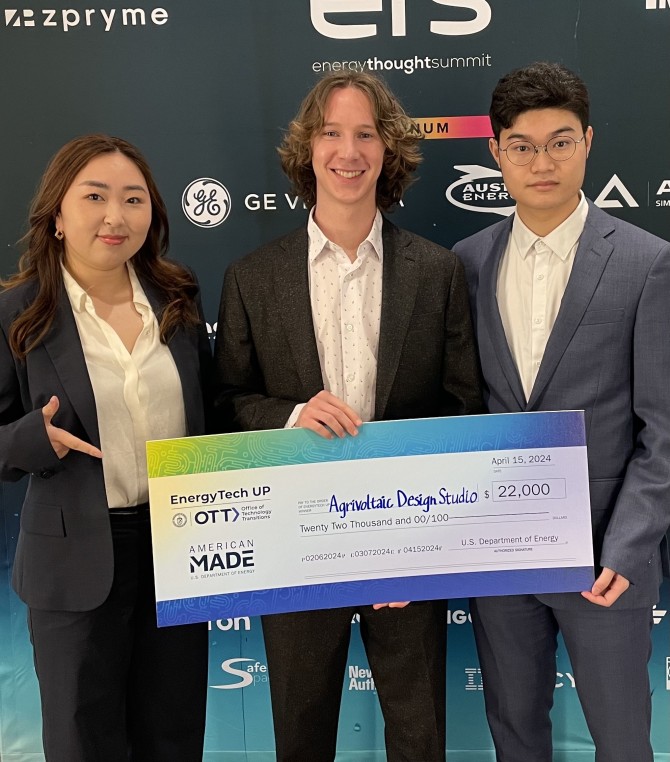News directly from Cornell's colleges and centers
Students win DOE solar prize with Agrivoltaic Design Studio
By Chris Dawson
A multidisciplinary team of Cornell graduate students has won the Department of Energy’s Solar Energy Technologies Office Bonus Prize in the 2024 EnergyTech University Prize competition. EnergyTech University Prize includes both student and faculty teams and is aimed at growing clean energy entrepreneurship.
Henry J. Williams and Mike Liao – both doctoral students in the Sibley School of Mechanical and Aerospace Engineering and advised by Max Zhang, the Irving Porter Church Professor of Engineering – and their teammate Eve Qian, Johnson Cornell Tech MBA student, were recognized for their entry “Agrivoltaic Design Studio.” The recognition included a $22,000 prize.
Agrivoltaics is a sustainable farming technique that combines agriculture and solar energy production. Their Agrivoltaic Design Studio is a software tool that allows solar project developers to work with farmers to design solar panel arrays for agricultural land that will take into account the soil, sun, and moisture conditions on a specific plot of land. In this way a solar project can be good for both the farmer and the power grid.
The competition began in February with 225 teams. After making it through the “Explore” and “Refine” phases of the competition in February and March, the Cornell team traveled to Austin, Texas, in April for the “Pitch” phase. During the event, the 28 finalist teams pitched their business plans to a panel of industry judges. At the conclusion of the event, the U.S. Department of Energy’s Office of Technology Transitions announced the three National Winners and 13 Bonus Prize Winners.
The office’s chief commercialization officer, Vanessa Z. Chan, said, “We see immense value in supporting the next generation of clean energy leaders through EnergyTech UP. These teams are working to develop attainable, equitable, scalable energy technologies and business opportunities. They have the potential to profoundly impact the cleantech industry, and we’re proud to provide resources that can help bolster their ideas.”
The design concept for the Agrivoltaic Design Studio was inspired by work in Zhang’s research group supported by the New York State Energy Research and Development Authority, the U.S. Department of Energy, and a Cornell Atkinson Center for Sustainability Graduate Research Grant. Williams, Liao and Qian had support at Cornell in preparing their business plan and their pitch as part of the Green Technology Innovation Fellowship program of the SC Johnson College of Business, which pairs graduate research students and MBAs.
“This competition gave us more incentive to fully flesh out our business model and create a pitch deck,” Williams said. “We spent a lot of time with mentors and entrepreneurs-in-residence working through the pitch deck. We also wrote a ten-page business plan for the final competition.”
Even with the move toward green energy in the United States, many agricultural counties have recently implemented policies designed to make it harder to develop large-scale solar projects. They are concerned about losing the agricultural nature of their communities. “Our Agrivoltaic Design Studio allows solar project developers to sit with landowners in the design phase of a project to create a design that takes into account the exact topography and microclimate of a site,” Liao said.
“It changes the way that solar developers operate. Our software allows developers to go into the community and really engage and co-design with farmers and the landowners,” Williams added.
“I strongly believe that agrivoltaics holds immense promise for enhancing equity in both agriculture and solar industries,” Qian said. “Achieving responsible implementation of agrivoltaics hinges on thorough research and validated data.”
The team plans to continue developing the technology and hope to launch a pilot project this year, with the eventual goal of bringing a product to market.
Media Contact
Get Cornell news delivered right to your inbox.
Subscribe

